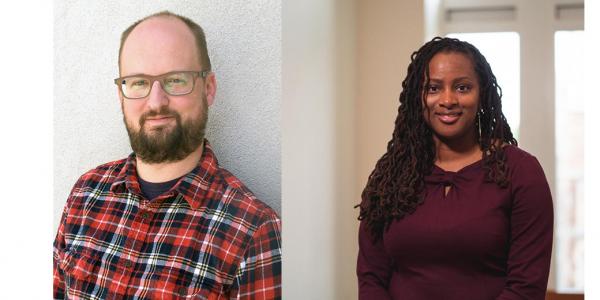Department of Music Lecture: WashU Faculty Patrick Burke & Lauren Eldridge Stewart
Patrick Burke - "Kongolandsbyen: Senegalese Music in Norway during the Age of Empire"
Kongolandsbyen, “the Congolese village,” was a popular feature of the 1914 Jubilee Exhibition held in Oslo’s Frogner Park to commemorate the centenary of Norway’s constitution. A troupe of eighty men, women, and children belonging to several ethnic groups within Senegal enacted a stereotyped vision of Africa in this staged community, which formed part of a larger trend of exhibitions of colonized peoples, or less euphemistically, “human zoos,” at fairs in the US and Europe. The “village” included musicians who performed for Norwegian audiences on instruments including kora and balafon. By depicting Senegalese music as supposedly “primitive,” Norwegian elites sought to uphold their own modernity and sophistication and to claim a place for Norway alongside Europe’s major colonial powers. Kongolandsbyen thus revealed as much about Norway’s marginal place in Europe as about its imagined relationship to Africa, and more about Norwegians’ desires and anxieties than about Senegalese music or its creators.
Lauren Eldridge Stewart - "Whose Mizik Klasik? Classical Music and the Boundaries of Genre in Haiti"
To those unfamiliar with Haiti, classical music may seem an unusual genre to associate with its national identity. However, once initiated into the network of summer camps that dot this country’s landscape, the complexity of both the genre and its use becomes more audible. Mizik klasik, or mizik savant (Largey, 2006), is simultaneously a broad category of practice and a contested narrative frame. Students may use it to refer to canonical European compositions or Haitian compositions from the written tradition. Both are practiced and performed regularly at recitals and concerts. Either use stands in tension with rara, an orally transmitted tradition that some argue is a truer representation of Haitian identity. A primary site for this debate over authenticity are the summer camps that teach mizik klasik. These camps gather students from across the country and invite clinicians from around the world. Thus, these debate grounds host local opinions from urban and rural locales within Haiti, surrounded by the conspicuous presence of foreigners. In this presentation, I will examine the contours of the debate as it unfolded when the rara band Follow Jah ran a series of clinics at summer music camps in 2014, including one at the Holy Trinity Music School.
All attendees are required to complete the health screener within 4 hours of their arrival to campus and be prepared to show the "Cleared for Campus" result to the event staff upon entry. All attendees must wear a mask at all times while indoors.
Visitor Screening Tool
WUSTL student/faculty/staff Screening Tool
WUSTL Visitor Policy

